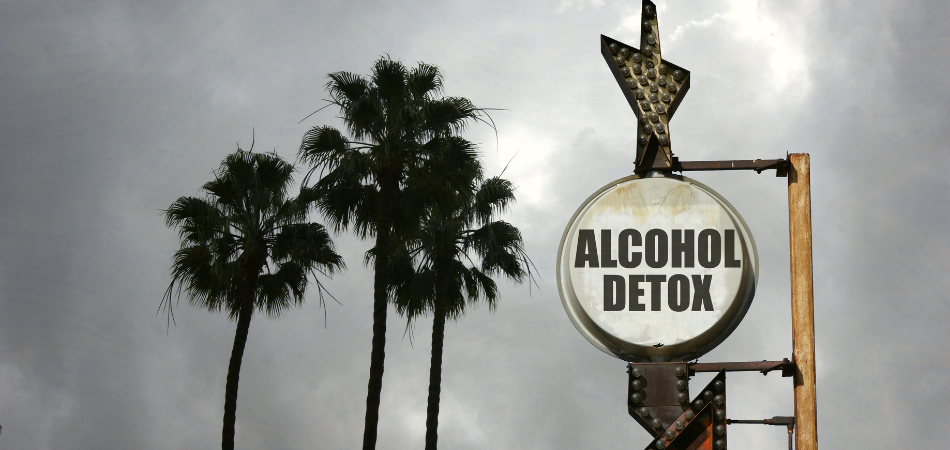Alcohol detox

Written by:

Medically Reviewed by:
Last Updated:
April 14th, 2025
If you are considering alcohol detox, you are not alone. Millions of people each year choose to go through detox in order to overcome their dependence on alcohol. But what is an alcohol detox, exactly? What happens during the process? And what are the risks and benefits associated with it? Alcohol detox can feel like an overwhelming task to undertake, but at Sanctuary Lodge, our team is here to guide you along the way.

What is alcohol detox?
Alcohol detox is the first step in overcoming alcohol addiction – when you cease to consume alcohol, the body naturally starts to expel all traces of harmful substances and toxins. You should think of alcohol detox as a way to restore your health and kick-start your recovery. Your body will begin to heal and repair itself, and as the detox process comes to an end, you will start to feel better both physically and mentally.
Although this initial period of treatment can be intense and often uncomfortable, completing alcohol detox will lay the groundwork for a strong onward recovery. During this time you will be closely monitored by medical staff who will assist you in managing any withdrawal symptoms – this is much safer than attempting to go ‘cold-turkey’ alone.
What is alcohol withdrawal?
If you drink alcohol excessively and for a long period of time, you may notice the onset of alcohol withdrawal symptoms if you try to detox. This is because your mind and body have become dependent on alcohol, so when you stop drinking, your brain and body have to try and adapt.
When you drink alcohol, it triggers a release of dopamine in the brain, which in turn triggers your brain’s reward system and makes you want to drink more. Eventually, the brain becomes accustomed to alcohol feeding your dopamine levels and relies on this to supply you with feel-good chemicals.
When you suddenly stop drinking or commence alcohol detox, your brain is thrown off balance and goes into withdrawal mode as it desperately searches for dopamine. This can result in some intense alcohol withdrawal symptoms that, if not managed correctly, could be life-threatening.
It is therefore very important that you undergo alcohol detox under the supervision of medical professionals who can monitor your symptoms and ensure your safety and comfort throughout the detox process. This will also help you to avoid relapse and give you the best chance at a successful detox and ongoing recovery.

Alcohol detox and withdrawal symptoms
Symptoms of alcohol detox and withdrawal can differ from person to person and range in severity depending on how long you have been drinking, how much alcohol you typically consume and your overall health. They can be physical, mental, or emotional in nature and usually begin within a few hours to a day after your last drink.
Some common symptoms of alcohol detox and withdrawal include:
- Anxiety and depression
- Reduced cognitive function
- Memory loss
- Insomnia
- Nausea or vomiting
- Sweating
- Shakiness
- Headaches
- Increased heart rate
- High blood pressure
- Tremors
- Hallucinations
- Disorientation and confusion
Delirium tremens (DTs) are the most severe form of alcohol detox and withdrawal and, although rare, can be life-threatening if not properly managed. Symptoms of DTs include disorientation, a racing heart, hallucinations, seizures, heavy sweating and fever.
Alcohol detox timeline
There are many factors that go into determining the length of your alcohol detox, including how much and how often you typically drink, as well as how long you’ve struggled with alcohol abuse. Those who seek help earlier in their addiction may have the advantage of a shorter alcohol detox period. In most cases, the alcohol detox process lasts anywhere from seven to fourteen days and typically alcohol withdrawal symptoms will begin to emerge as early as two hours after your last consumption.
Most people are expected to encounter the following alcohol detox timeline:
First twelve hours after last drink – The first few hours of alcohol detox are usually mild, with symptoms gradually worsening as time goes on. You may experience shaking, nausea, headaches, and a sense of unease.
One to four days after last drink – As alcohol detox continues, symptoms such as anxiety, depression, and insomnia begin to set in. You may also vomit or start to feel nauseous and disorientated. Hallucinations, hand tremors, and even seizures may also occur. It is during this timeframe that you can expect the most severe of your symptoms to appear. You should be aware of any signs of delirium tremens (DTs) that usually surface within three to four days of your last drink.
Five to seven days after last drink – During this time, alcohol withdrawal symptoms will slowly begin to subside as your detox period starts to taper. You may still have trouble thinking clearly, and will likely feel very weak and unsteady on your feet.
One week and onwards – Hopefully by this time the majority of your alcohol withdrawal symptoms will have dwindled. However, you may still experience some lingering anxiety, fatigue and insomnia during this last stage of alcohol detox.
In some cases, these symptoms will persist for several months to a year. This is classified as post-acute withdrawal syndrome (PAWS). If you have completed alcohol detox and believe that you are suffering from PAWS, it is a good idea to speak to your doctor who will be able to help you manage the prolonged symptoms associated with this condition.

What are the risks of alcohol detox?
While alcohol detox is a necessary step in overcoming your unhealthy relationship with drinking, it does come with certain dangers that need to be taken into consideration. The most common and serious complication associated with alcohol detox is delirium tremens (DTs), which can be life-threatening if not handled correctly.
Other risks involved with alcohol detox and withdrawal include:
- Dehydration
- Heart problems
- Worsening of mental health symptoms
Quitting ‘cold-turkey’ and battling alcohol detox in the comfort of your own home can seem like an appealing option, but is it worth the risk? The unpredictability of alcohol detox and withdrawal coupled with the potential for dangerous and fatal side effects like DTs and cardiac issues, means that the safest option is to check in to your nearest alcohol detox clinic.
Here you will be supervised by medical staff who can prevent and treat any dangerous or harmful side effects. You will also be provided with support from therapists, as well as a group of people going through similar circumstances, ensuring your emotional security and well-being as you detox.
The benefits of alcohol detox
Despite the notable risks accompanying alcohol detox, there are a great many benefits that make it worthwhile. These benefits far outweigh the possibility of complications associated with the alcohol detox process, and include:
- Improved mental clarity and focus
- Increased physical energy
- Reduced anxiety and depression
- Improved sleep quality
- Lower blood pressure
- Improved cardiovascular health.
- Reduced risk of developing chronic health conditions, such as liver disease
Thankfully the alcohol detox period is relatively short, with severe alcohol withdrawal symptoms only lasting a few days. While detoxing from alcohol can be a difficult and distressing process, keeping these benefits in mind will aid you in your recovery. Not only will you be improving your physical health, but you will also be giving yourself a chance to change your relationship with alcohol and start fresh.
At Sanctuary Lodge, our clients’ sobriety remains our number one priority. Our team is dedicated to taking the stress and worry away from you during your alcohol detox, enabling you to fully focus on getting sober. With us, you can relax knowing that you are in safe hands.
Daniel, a previous Sanctuary Lodge client, shares his alcohol detox experience:
“Sanctuary Lodge was the one [detox and rehab facility] that was an improvement of my expectations because the place was so comfortable. Everyone was lovely and amazing. [I was] absolutely shocked by the level of love and support.”
Attending an inpatient detox and treatment centre like Sanctuary Lodge not only helps you to get your life back on track, but also provides you with a support network of understanding, like-minded individuals. Having that level of solace is particularly beneficial in championing your long-term sobriety and helping you through alcohol detox.
Does detoxing from alcohol mean I’m cured?
Although it is a necessary first step, detoxing from alcohol is unfortunately not the end of your treatment or recovery. Alcohol use disorder is a chronic condition that will need to be managed long-term, and possibly throughout your entire lifetime.
During alcohol detox, you will also take part in alcohol rehab. This method of treatment will help you to understand and manage your alcohol use, identify the underlying causes of your drinking, and assist you in developing healthy coping mechanisms to deal with triggers and cravings. In order to achieve long-term recovery, you’ll work on changing your lifestyle and developing relapse prevention techniques to help you maintain healthier habits.
Once you have successfully completed alcohol detox and start to feel better, it is tempting to see your recovery as complete at this stage. However, it’s important to remember that detoxing is not the same as recovering from alcoholism. Detox alone treats the physical aspect of addiction, but you still need to address the psychological factors that led you to start abusing alcohol.

Next steps
Facing alcohol detox and getting the help you need is a brave step to take, but it is not something you have to do alone. Thankfully there are many resources available to help you through this challenging time. If you or someone you know is struggling with alcohol abuse, please reach out for help so our team at Sanctuary Lodge can guide you through the alcohol detox process.
Frequently asked questions
However, withdrawal symptoms that are associated with substance detox are also a result of giving up addictive behaviours and may include:
- Cravings
- Stress
- Anxiety
- Depression
- Irritability
- Mood swings
- Insomnia
- Restlessness
At Sanctuary Lodge, we will help you manage these withdrawal symptoms while you are working to overcome your behavioural addiction.



